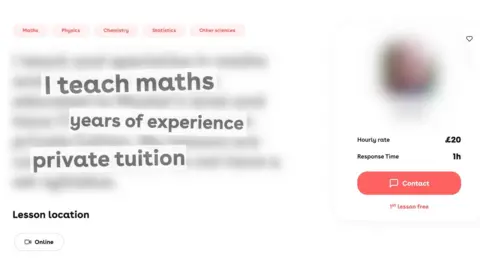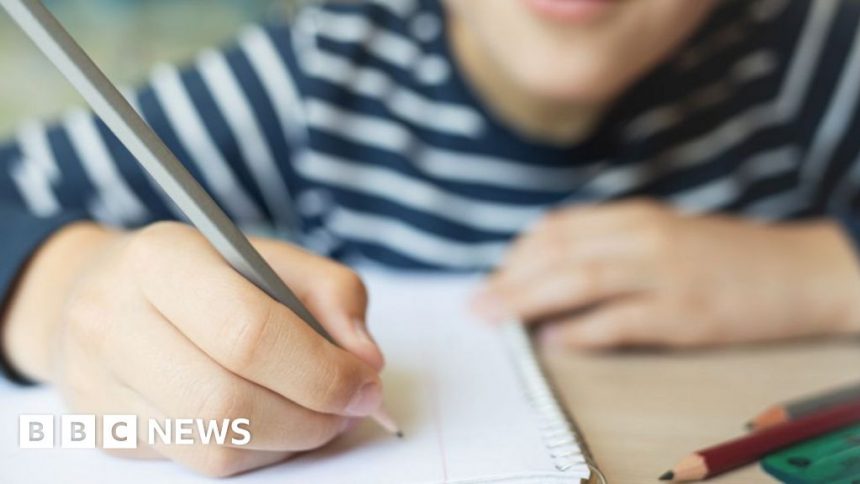Sex charge tutor case reveals ‘massive’ safeguarding hole
 Getty Images
Getty ImagesA man charged with sexual assault has been advertising as a private tutor for children in maths and science, a BBC investigation has found.
The man, who we’re not naming for legal reasons, left his job as a teacher last year.
Bail conditions prevent him having any contact with children and he is due to stand trial in March.
We also found another teacher who has been barred from the classroom by a disciplinary panel but is now advertising one-to-one online tutoring sessions.
It comes after the BBC reported more than 90 private tutors had been convicted of sexual crimes against children over the last 20 years.
BBC News has continued to examine the tutoring industry, in which there is no legal obligation for private tutors to undergo any background checks or be qualified to teach.
Charities say the cases of the two private tutors highlight a lack of regulation in this area.

Until recently the ex-teacher who is charged with sexual assault had a personal tutoring website and an online advertisement which remained active.
The ad was only removed after the BBC made contact.
We don’t know whether the man continued giving private lessons in maths and science after he was charged, but in a phone call he claimed to have stopped.
“It’s a massive hole in safeguarding,” says Marilyn Hawes, chief executive of the child protection campaigning group Freedom from Abuse.
“It’s a huge risk. The onus is on the individual [tutor] to be honest.”
The second tutor we found is a former science teacher who was brought before a disciplinary panel after taking a pupil on an overnight trip.
The panel heard the girl’s parents had given permission for the outing and ruled that his interest in the child had been paternal and not sexual in nature.
But it decided his conduct was unacceptable and he had failed to maintain appropriate professional boundaries.
He was banned from teaching indefinitely and cannot teach in any school, sixth form college, relevant youth accommodation or children’s home in England.
He has been given permission to appeal against the decision in two years’ time.
Criminal checks
Anyone wanting to work with children has to apply for a DBS – or Data and Barring service – check, which looks at criminal records and other databases of individuals banned from this kind of work.
There are three types, basic, standard and the most detailed – an enhanced check.
Under current regulations the former teacher does not need a DBS check to work as a tutor.
But in his case, if an enhanced check had been done, it would have revealed the outcome of the disciplinary panel.
We discovered the man is still offering private online tuition.
We contacted him, posing as a parent, asking about lessons for a 15-year-old girl.
He messaged back, offering GCSE support with exam techniques and a trial online lesson.
Following our investigation in September, the Children’s Commissioner for England, Dame Rachel de Souza, called for all private tutors to be properly DBS checked.
The Tutors’ Association, an optional membership organisation that represents 50,000 tutors across the UK, already demands its members have an enhanced DBS check.
‘My daughter was put at risk’
Our original report prompted several emails to the BBC from victims of abuse. They didn’t want to give their names.
“I had a tutor at the age of 12. He tried to touch my breasts,” wrote one anonymous contributor. “I ran away to the bathroom and locked myself in. I refused all future lessons with him.”
A mother told us that she had dismissed her daughter’s English tutor for swearing and using inappropriate language. She told the tutor’s agency but it took no action.
“I later found out the tutor had been in a news report for physical assault,” she said. “My daughter was put at risk.”
The BBC has not corroborated their stories.
The tutor who had been charged with sexual assault had been advertising on a website called Superprof.
It claims to be the top platform for private tutoring in the UK.
The company says it expects its tutors to have a DBS check and it encourages them to keep it updated.
There’s no suggestion that Superprof could have known about the charge against this particular tutor.
It’s not clear when the man posted his advert, or whether he provided a clear DBS check, carried out before he was charged.
However, even an enhanced DBS only provides a snapshot of the applicant’s criminal record at the time of application.
Superprof told BBC News: “Our priority is the safety and wellbeing of everyone who uses the platform.”
The platform said tutors are asked to upload identification, education and work credentials when they sign up.
Tutors also contacted the BBC to say they want to be able to get an enhanced DBS check to reassure clients. But these can only be applied for by an employer or an approved organisation.
One told us: “It should be a legal requirement, just like if you work in a school.”
The government says it expects tutoring agencies to follow safeguarding guidance – and that means DBS checks should be undertaken.
The Department for Education says it is now considering what further action might be appropriate.
Ms Hawes, from Freedom from Abuse, suggests adults accompany children to tutoring sessions, adding: “If you’re taking your child to a tutor’s home, sit in the room with them, sit in the corner and read a book while they’re having their lesson.”
If you are experiencing any of the issues mentioned in this story you can visit BBC Action Line for a list of websites and helplines that can offer direct help at any time.






